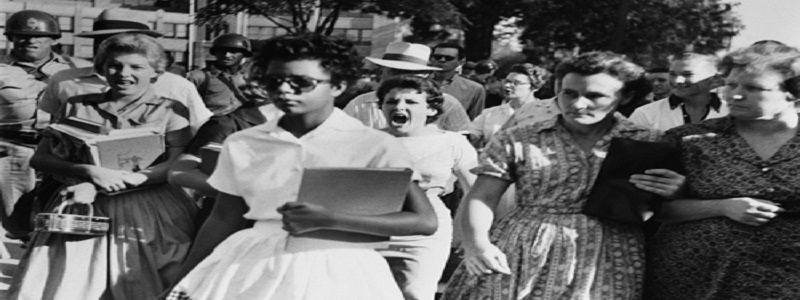The Issue of Free Public College and an Argument Writing Assessment
Overview of the Issue
One of Abraham Lincoln’s great achievements as President was to found in 1861 land grant colleges, which evolved into the nation’s four-year public colleges and universities. A college education at a public university has been a ticket into the middle class and upward mobility and opportunity for millions of people. For about 100 years – and most especially after World War II and the passage of the GI Bill – the cost of going to a public college or university was minimal or free. However, over the past 30 years, tuition at these institutions of higher learning has been climbing steadily. Today, the average tuition at four-year public college is nearly $20,000 per year. With room and board, the cost has climbed to more than $40,000 annually.
An Example of Analytics on a Refutation Activity in a Unit on the Little Rock Nine
Overview
Timely, detailed, standards-referenced feedback is a teacher practice that credible, persuasive research demonstrates can effect dramatic results on student learning and academic performance (see, for example, Hattie, J., & Timplerly, H. (2007). “The Power of Feedback,” Review of Educational Research, 77( 81), 81–112; Hattie, J., Fisher, D., Frey, N. (2016), “Do They Hear You,” Educational Leadership, 7 (73), 16-21). Argument-Centered Education recommends producing what we call “analytics” in response to student formative assessments of argumentation skills. Analytics should identify patterns in student understanding, identifying leverage points for student growth, and they should isolate individual student work samples to demonstrate current proficiencies, and ways to accentuate these, and deficiencies, and ways to redress these, relative to specific performance criteria.
Not All at Once: Academic Argument Skills Building Sequences for HS and MS
Teachers and administrators from Argument-Centered Education partner schools have made an important request over the past couple of years: since we cannot expect students to learn the difficult skills of academic argumentation all at once, how can these skills be taught and built in sequence?
Document-Based Argument Writing: Immigration from the Middle East
This is an argument-centered writing assessment designed to develop students’ critical thinking and writing skills, in an in-class and on-demand setting. Both because of the college-directed rigor of the preparatory work that students will be immersed in, and because of the conditions under which students will be writing, this assessment is also highly aligned with the new SAT exam, so it is an authentic, properly embedded and seamless part of an instructional strategy that has raising students’ college exam scores as one of its objectives. And finally it is document-based, so it parallels the kind of AP Exam writing that many students will be striving to master.
Issue: The United States should significantly restrict immigration from the Middle Eastern due to the possibility of terrorism.
READ MORE
‘El Deafo’ and the Argument Writing Response Activity
El Deafo (2012) is the popular and subtly powerful autobiographical graphic novel by Cece Bell. It tells the author’s story of growing through the middle grades circa 1980, having just been struck mostly deaf by meningitis. The protagonist is shown grappling with how disorienting is her disability at first, then with its social and emotional impact on her early adolescence. The work is notable for its honesty, charm, and surprising poignance.
With one of our partner middle schools this year Argument Centered Education developed the Argument Writing Response Activity (AWRA). Teachers at this school wanted to be sure that the year ended with an argument writing project that brought together some of the skills-building work they had been doing in classroom speaking and discussion, especially in the second semester. AWRA has students make interpretive arguments, respond to other students’ arguments with counter-arguments, and respond to the counter-arguments of their peers. AWRA in effect takes portions of a spoken debate and asks students to put their point/counter-point in written form, enabling students to recognize and enact the underlying bond between classroom argumentative discussion and debate, and academic writing.






